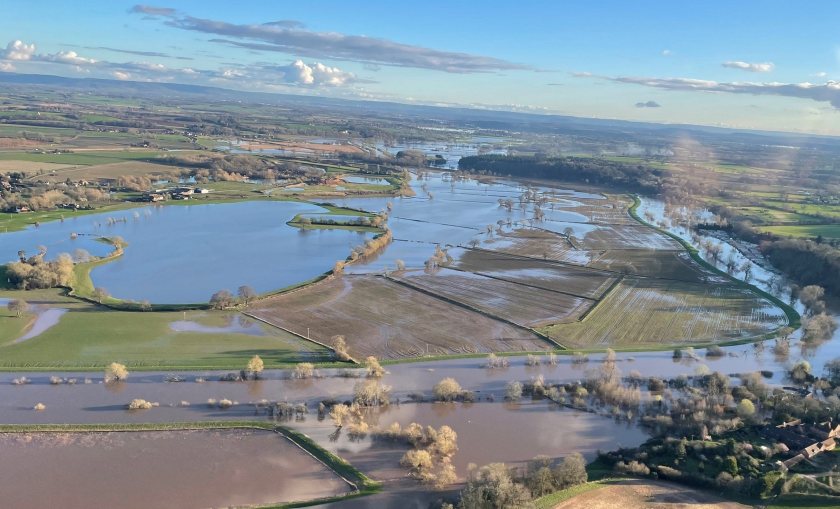
The government's newly announced Farming Recovery Fund has been heavily criticised for locking too many flood-stricken farmers out from applying to it.
Defra opened the new fund earlier this week to support farmers who had suffered uninsurable damage to their land due to flooding this winter.
Under the scheme, farmers can access grants of between £500 and £25,000 to return their land to the condition it was in before flooding due to Storm Henk.
However, the NFU said there were already 'major issues' with the fund's eligibility.
According to the union, some farmers who suffered catastrophic impacts were told by the Rural Payment Agency (RPA) that they were not eligible for the fund.
This was mainly due to the fact that some of their affected areas were more than 150 meters from ‘main’ rivers.
The NFU said these included farmers with 90% of their land saturated or underwater, and huge damage to buildings and equipment.
“We are taking this up with Defra urgently," said NFU vice president, Rachel Hallos.
"I cannot believe this is what ministers intended when they launched the fund, which was a welcome and well-intentioned development which seems to have been fundamentally let down in the detail.
"While the impact of the weather goes far beyond Storm Henk, this could have been a good start but, as it stands, it simply doesn’t work.”
Relentless heavy rain since October 2023 has left vast swathes of agricultural land saturated and in many cases still under water, with many arable farmers unable to plant crops and losing those that were in the ground.
The rain, combined with unseasonal low spring temperatures, is also having a major effect on livestock farmers, with a bleak attrition rate for lambs born this spring already clear.
Who is eligible for the fund?
The grant is to support the cost of recultivating and reinstating agricultural land that was flooded due to notably high river levels between 2-12 January 2024, caused by Storm Henk.
The Rural Payments Agency is administering the fund on behalf of Defra, with landowners or tenant farmers who occupied eligible land parcels at the time of Storm Henk able to claim £130 per hectare for recultivation work.
Eligible farmers can access grants of between £500 and £25,000 to return their land to the condition it was in before exceptional flooding due to Storm Henk.
The eligible counties and rivers announced at this time are listed below:
• Gloucestershire – River Severn, River Thames and River Avon
• Leicestershire – Rothley Brook, River Wreake and River Soar
• Lincolnshire – River Witham, River Brant, River Welland, River Ancholme
• Nottinghamshire – River Trent, River Devon and River Soar
• Somerset – River Brue, River Exe, River Parrott and River Tone
• Warwickshire – River Avon and River Leam
• West Northants – River Nene and River Gt Ouse
• Wiltshire – River Avon (Hants), River Avon (Bristol), River Kennet, River Thames, River Bourne and River Wylye
• Worcestershire – River Severn, River Teme and River Avon
• Counties under review at this stage are Berkshire, Herefordshire, Oxfordshire, Surrey, Staffordshire, Yorkshire, Norfolk and Derbyshire.
The RPA is contacting those landowners and tenant farmers that they believe are eligible having used satellite imagery and river gauge level data to work out which land parcels were flooded between 2-12 January 2024.
The following criteria will also be taken into account when contacting those eligible:
• Eligible agricultural land parcels must be located within 150m of the midpoint of a named river within specific counties.
• Land will not be eligible if it is in a designated flood storage area.
• Land parcels included under the Countryside Stewardship scheme that have flood resilience options (SW12, 15 and 16) claimed are not eligible.
• Land parcels must be registered as agricultural land in the Rural Payments service.
